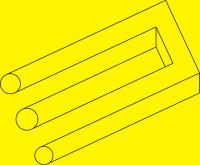Whats good VFD for spindle control with LinuxCNC?
- Robotwizard
- Offline
- New Member
-

Less
More
- Posts: 11
- Thank you received: 0
23 Jul 2016 06:12 #77865
by Robotwizard
Whats good VFD for spindle control with LinuxCNC? was created by Robotwizard
Was planning to get a Teco FM50 for my lathe CNC conversion until I discovered that the 0-10 volt speed control input doesn't play well without an expensive DAC board to put in between. Are there any VFD's to look at that would be compatible?
Please Log in or Create an account to join the conversation.
- Rick G
-

- Offline
- Junior Member
-

Less
More
- Posts: 27
- Thank you received: 114
23 Jul 2016 07:51 - 23 Jul 2016 08:10 #77866
by Rick G
Replied by Rick G on topic Whats good VFD for spindle control with LinuxCNC?
wiki.linuxcnc.org/cgi-bin/wiki.pl?VFD_Modbus
and
github.com/bebro/linuxcnc-huanyang-vfd
I have used
Mesa 7i76
store.mesanet.com/index.php?route=produc...t_id=119&search=7i76
and
cnc4pc c6
cnc4pc.com/c6-variable-speed-control-board.html
Rick G
and
github.com/bebro/linuxcnc-huanyang-vfd
I have used
Mesa 7i76
store.mesanet.com/index.php?route=produc...t_id=119&search=7i76
and
cnc4pc c6
cnc4pc.com/c6-variable-speed-control-board.html
Rick G
Last edit: 23 Jul 2016 08:10 by Rick G.
Please Log in or Create an account to join the conversation.
- Muzzer
- Offline
- Elite Member
-

Less
More
- Posts: 265
- Thank you received: 41
23 Jul 2016 12:08 #77874
by Muzzer
Replied by Muzzer on topic Whats good VFD for spindle control with LinuxCNC?
I was planning on controlling my Yaskawa VFD directly using the 7i76 spindle (analogue "pot") output to control the speed. I wasn't aware that there was a problem. Can anyone point me a a thread that explains the issue?
Please Log in or Create an account to join the conversation.
- BigJohnT
-

- Offline
- Administrator
-

Less
More
- Posts: 3990
- Thank you received: 994
23 Jul 2016 13:05 #77878
by BigJohnT
Replied by BigJohnT on topic Whats good VFD for spindle control with LinuxCNC?
The
SPINx1
s a one channel isolated digital potentiometer intended for spindle control. The SPINx1 takes three TTL level signals, PWM, DIR and ENA and has four isolated outputs: CW, CCW, ENA and VOUT. VOUT is a Analog voltage proportional to the PWM input signal and the Analog reference voltage (5 to 18VDC). The SPINX1 outputs 0 to 100 percent of the supplied voltage, its a potentiometer replacement. Input voltage must be from 5 to 15V.
JT
JT
Please Log in or Create an account to join the conversation.
- Muzzer
- Offline
- Elite Member
-

Less
More
- Posts: 265
- Thank you received: 41
23 Jul 2016 17:47 #77891
by Muzzer
Replied by Muzzer on topic Whats good VFD for spindle control with LinuxCNC?
Aha, seems I'm worrying about nothing. That's how I expected it to work. In my paranoia, I misread Rick G's reply to mean he needed both a 7i76 AND a CNC4U board. In fact they are alternative solutions.
Please Log in or Create an account to join the conversation.
- andypugh
-

- Offline
- Moderator
-

Less
More
- Posts: 19802
- Thank you received: 4609
25 Jul 2016 12:46 #77980
by andypugh
In between what?
Are you wanting a VFD that will run from a parallel port? If not, can you be more specific about what you are trying to achieve?
You might find Modbus to be easier, and rather more flexible. I have found the Huanyang VFDs on eBay to be cost-effective, and they work very nicely with LinuxCNC, the hy_vfd HAL component and a £1 USB to RS485 adaptor.
Replied by andypugh on topic Whats good VFD for spindle control with LinuxCNC?
Was planning to get a Teco FM50 for my lathe CNC conversion until I discovered that the 0-10 volt speed control input doesn't play well without an expensive DAC board to put in between. Are there any VFD's to look at that would be compatible?
In between what?
Are you wanting a VFD that will run from a parallel port? If not, can you be more specific about what you are trying to achieve?
You might find Modbus to be easier, and rather more flexible. I have found the Huanyang VFDs on eBay to be cost-effective, and they work very nicely with LinuxCNC, the hy_vfd HAL component and a £1 USB to RS485 adaptor.
The following user(s) said Thank You: Robotwizard
Please Log in or Create an account to join the conversation.
- Robotwizard
- Offline
- New Member
-

Less
More
- Posts: 11
- Thank you received: 0
26 Jul 2016 05:31 #78031
by Robotwizard
Replied by Robotwizard on topic Whats good VFD for spindle control with LinuxCNC?
Yes, between the VFD and par port. The FM-50's I was looking at don't have Modbus/RS-485 so thanks for the advice. I haven't been able to find any manuals or specs for the Huanyang products yet tho.
Please Log in or Create an account to join the conversation.
- andypugh
-

- Offline
- Moderator
-

Less
More
- Posts: 19802
- Thank you received: 4609
26 Jul 2016 08:37 #78033
by andypugh
Try this link:
www.jinlantrade.com/ebay/invertermanual.pdf
But you don't need to know most of that if using the LinuxCNC HAL component
If you prefer to use parport control then you ideally need to convert 3 of your output pins to FWD/REV or ENA/DIR and a PWM output for the speed control. You can potentially configure the VFD for 0 to 5V operation and use a simple RC filter to make the parport PWM into a variable voltage, but it is likely to be non-linear and isn't well isolated.
Better than using a simple RC filter would be to use an opto-isolator and then use the 10V supply from the VFD into your RC filter. This gives you the full 0 to 10V range, protects the parport and should be more linear if (and ony if) you select an opto-isolator with both current-sourcing and current-sinking outputs.
One of these will work well
www.farnell.com/datasheets/611920.pdf
Basically you connect the parport to the left-hand side and the VFD 10V and GND to Vcc and GND. Then a resistor from Vo to one side of a capacitor, the other side of the cap to GND and then connect the VFD 0-10V input to the top of the cap too. Choose R and C to suit the time-constant you need. (say 1/20 the PDM rate. (Use PDM rather than PWM for this)). The reason to use this device is that it will actively charge and discharge the cap through the filter resistor, whereas using a conventional 4-pin opto you need a bleed resistor to discharge the cap, and that makes it non-linear.
Or get a Mesa SPINX1 which is meant for exactly this job
Replied by andypugh on topic Whats good VFD for spindle control with LinuxCNC?
Yes, between the VFD and par port. The FM-50's I was looking at don't have Modbus/RS-485 so thanks for the advice. I haven't been able to find any manuals or specs for the Huanyang products yet tho.
Try this link:
www.jinlantrade.com/ebay/invertermanual.pdf
But you don't need to know most of that if using the LinuxCNC HAL component
If you prefer to use parport control then you ideally need to convert 3 of your output pins to FWD/REV or ENA/DIR and a PWM output for the speed control. You can potentially configure the VFD for 0 to 5V operation and use a simple RC filter to make the parport PWM into a variable voltage, but it is likely to be non-linear and isn't well isolated.
Better than using a simple RC filter would be to use an opto-isolator and then use the 10V supply from the VFD into your RC filter. This gives you the full 0 to 10V range, protects the parport and should be more linear if (and ony if) you select an opto-isolator with both current-sourcing and current-sinking outputs.
One of these will work well
www.farnell.com/datasheets/611920.pdf
Basically you connect the parport to the left-hand side and the VFD 10V and GND to Vcc and GND. Then a resistor from Vo to one side of a capacitor, the other side of the cap to GND and then connect the VFD 0-10V input to the top of the cap too. Choose R and C to suit the time-constant you need. (say 1/20 the PDM rate. (Use PDM rather than PWM for this)). The reason to use this device is that it will actively charge and discharge the cap through the filter resistor, whereas using a conventional 4-pin opto you need a bleed resistor to discharge the cap, and that makes it non-linear.
Or get a Mesa SPINX1 which is meant for exactly this job
The following user(s) said Thank You: Robotwizard
Please Log in or Create an account to join the conversation.
- Robotwizard
- Offline
- New Member
-

Less
More
- Posts: 11
- Thank you received: 0
26 Jul 2016 22:37 #78056
by Robotwizard
Replied by Robotwizard on topic Whats good VFD for spindle control with LinuxCNC?
Checked out the manual for the HY VFD. The manual shows they operate at 50hz input , but the ads I'm seeing on Ebay show 50-60hz. Am I understanding correctly that because the braking resistors are an external accessory option that there will be no ramping down or braking capabilities without these added resistive loads? So it will just freewheel to a stop without it?
Please Log in or Create an account to join the conversation.
- andypugh
-

- Offline
- Moderator
-

Less
More
- Posts: 19802
- Thank you received: 4609
27 Jul 2016 09:43 #78062
by andypugh
Replied by andypugh on topic Whats good VFD for spindle control with LinuxCNC?
Without braking resistors the VFD will still brake to a halt, but the rate at which is can do so without a bus-overvolt fault will be limited.
For many machine tools the deceleration rate without additional resistors will be perfectly adequate.
There is no reason for a VFD to care about mains frequency at all. They can run OK on anything from DC to whatever frequency the switching speed of the rectifier diodes on the input stage an handle.
For many machine tools the deceleration rate without additional resistors will be perfectly adequate.
There is no reason for a VFD to care about mains frequency at all. They can run OK on anything from DC to whatever frequency the switching speed of the rectifier diodes on the input stage an handle.
Please Log in or Create an account to join the conversation.
Moderators: PCW, jmelson
Time to create page: 0.124 seconds
